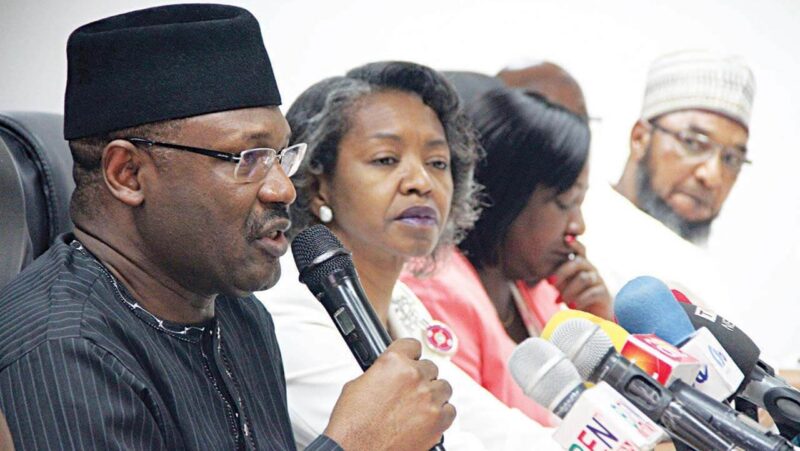Political Issues
INEC Plan To Switch To Electronic Voting Without Indigenous Cybersecurity Companies, Should Nigerians Be Concerned? -By Moshood Olajide
Should this prototype of scenario transpire in a National election in Nigeria, it can finally set the stage for the division of the country or another civil war and should this happen; due to differences in ideological orientation across the six geo political zones, Nigeria might be a fertile ground for the great powers to muscle their strength like the 1953 Korean war where the Soviet Union occupy North Korea and the United States occupy South Korea which effectively divide the homogeneously strong Asian country up till today.

While commendation has been trailing the recent announcement by the Independent National Electoral Commission to commence the process of implementing electronic voting in the country. This of course is good, but utmost cautiousness should be taken into consideration especially with the rise of cyber espionage giving foreign governments and hackers the ability to launch sophisticated intrusions into the networks that control electronic voting causing computer induced failures and data manipulation.
There have been shift in the character of warfare ever since states in the international political system have refrained from employing nuclear weapons against perceived adversaries out of fear that such weapons might be used against them in massive retaliation leading to large scale catastrophic destruction, cyber warfare has therefore become the new tool of conventional warfare for the fact that it is cost effective and it has the advantage of domain of aggression becoming untraceable making it easier for non-state entities like terrorists and cybercriminals to perpetrate crime for their personal objectives or been hired by state actors who wanted to avoid attribution by inflicting damage on another country by proxy.
An example of such is when the world was alarmed on January 18th, 2009 when Kyrgyzstan’s two main internet servers came under attack from an organized crime group whose IP address was to later traced back to Russia, the attack which is enough to paralyze the country as the cyber-attacks were sufficiently strong enough to shut down all websites and emails within the country. It is interesting to note that the attacks occurred on the same day the Russian government had demanded from Kyrgyzstan that the US access to the airbase at Manas which is a strategic logistic center supporting the United States military operations in Afghanistan where both Russia and the US have conflicting interests be terminated. The cyber assault eventually served its purpose as Kyrgyzstan informed the American government that its access to the Manas air base will be terminated. And the cyber-attacks halt immediately.
The Russian government meddling in to the United States Presidential election by hacking in to the portal of the Democratic Party National Convention, obtaining highly sensitive information in the process to the spreading of disinformation with the aim of sowing discord by the Chinese government through hacking in to popular Taiwanese websites in an attempt to influence the January 2020 Taiwan Presidential election conducted in January to the takedown of France’s TV5 by hackers traced to Eastern Europe and to the takedown of Sony Motion Pictures by North Korea are other notable historic examples of cyber-attack directed against a sovereign country and business organizations.
These are where Nigeria needs to learn from and lessons should be learned from the 2020 Nigerian Bar Association [NBA] election where one of the Presidential candidate [Dele Adeshina SAN] alleged manipulation, citing inconsistency such as falsification of figures and fabrication of unregistered Lawyers to vote in the NBA website, this has already divided the association in to different factions. Should this prototype of scenario transpire in a National election in Nigeria, it can finally set the stage for the division of the country or another civil war and should this happen; due to differences in ideological orientation across the six geo political zones, Nigeria might be a fertile ground for the great powers to muscle their strength like the 1953 Korean war where the Soviet Union occupy North Korea and the United States occupy South Korea which effectively divide the homogeneously strong Asian country up till today. Hence, the reason to be cautious by INEC in either delaying e-voting procedures for now or work assiduously towards choosing the right electronic voting specification adaptable to our political climate where hacking can be avoided at all cost or measures put in place to avert it are put in place through a national IT infrastructure.
In fact, relying on foreign IT firms to handle the digitalization of voting in the country is not good enough as their country home government have access to their operating system which is a precondition for getting license in most advanced countries – the implication of this is that the government of another country can have a clue to the direction of voting process in Nigeria, knowing the candidate who is leading, the one losing and can decide to influence the election should they have a candidate like China intends to do in the Taiwan Presidential election. This does not augur well for the national security of Nigeria.
Nigeria as a multiethnic country with multidimensional political structure cannot afford to witness any of the occurrences cited previously, it will set the country on fire. Before starting electronic voting, there ought to be reliable government initiated or indigenous cyber security companies investing in advanced information technology infrastructure to handle the manufacturing of voting machines and at the same time acting as defensive platforms against cyber-attack – this will be a long term strategy of avoiding infiltration or manipulation of voting statistics on the system by an interested outsider or organized crime gangs on Nigeria elections.
Moshood Olajide is the Principal Head of MIPAG Policy Think Tank Group



















